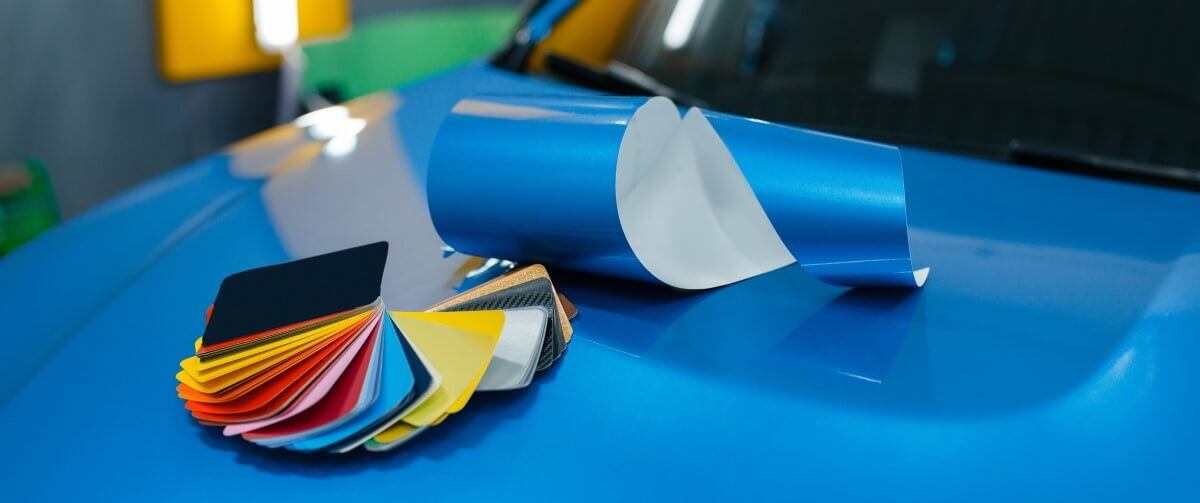When it comes to vehicle wraps, 3M and Avery Dennison offer some of the most popular products on the market – and for good reason. Both have a long history as market leaders, with a wide selection of vinyl options to choose from, but which is better?
This guide breaks down the key differences between 3M and Avery Dennison into easy-to-follow categories. These include materials, adhesives, warranty, installation, price, and colour options.
Materials
Most wrap manufacturers use two types of vinyl known as ‘calendared’ and ‘cast’ vinyl.
Cast vinyl is a thin and flexible film made by pouring liquid vinyl into a mould and letting it cure. This enables it to conform to the contours of the vehicle. Calendared film is stretched and compressed to the desired shape, and as a result, it’s the least flexible of the two.
Cast vinyl films typically last between 5 and 7 years, while calendared films can last between 3 and 5 years. When comparing 3M vs Avery Dennison, it’s worth noting they both use cast and calendared vinyl in their product ranges. At the higher end of the range, cast vinyl is more durable and longer lasting than other types.

Adhesive
3M and Avery Dennison use slightly different adhesives to aid the installation process.
3M uses a pressure-sensitive adhesive called Controltac, which only sticks to the surface once force is applied. In turn, the vinyl film can be repositioned until the installer’s ready to apply it to the surface. It can also be removed without leaving any residue.
Avery Dennison has its own pressure-sensitive product known as Easy Apply, which allows it to be repositioned in the same way, while limiting the risk of wrinkles and air bubbles.
Both 3M and Avery Dennison have air release channels in their products so air bubbles can be released as the wrap is installed.

Warranties
3M and Avery Dennison make premium materials that come with standard manufacturer warranties. These cover product failure, such as cracking of the print film or protective laminate, premature fading of colours, and adhesion failure.
The length of your warranty can depend on your location, the product used, and the placement of the wrap on your vehicle. For example, if you use Black & White Avery Dennison Supreme Wrapping Film in the UK, the vertical part of the wrap may be guaranteed for longer than the horizontal sections.
3M offers ‘basic’, ‘enhanced’ and a ‘matched component system warranty’ that may apply if your wrap was made exclusively with 3M products and components. They also offer a performance guarantee to ensure their vinyl products last for at least 3 years.
Avery Dennison’s standard warranties cover the shelf life of the products. Their ICS performance guarantee is an extended warranty for all wraps made with Avery-specified printers and inks. The ICS platinum warranty is customised for each project, as agreed between the installer and Avery Dennison itself.
You can find out more in our warranty guide, or check out our comparison of 3M, Avery, Arlon, Orafol, Matac and Metamark warranties.
Installation
Experienced installers will find 3M and Avery Dennison wrapping films simple to apply.
However, 3M tends to chase first-time bespoke and colour change clients, while Avery Dennison leans towards companies that will complete the job to a professional standard.
3M has a protective film that sits over the vinyl during installation to defend against scratches. Once the wrap has been applied, this layer is peeled off to reveal the unblemished vinyl underneath. While Avery Dennison makes high-quality vinyls, they don’t currently offer a similar product.
Price
The cost of a vehicle wrap depends on design complexity, the material, and the size of your vehicle.
3M is generally considered the more expensive brand on the market, though Avery Dennison is close behind. Most suppliers will use the most suitable vinyl for your project, whether it’s from 3M, Avery Dennison, or another manufacturer like Arlon.
Visit our guide on how much vehicle wraps cost for a breakdown of pricing, and to see what you might pay based on the size of your vehicle and the type of wrap chosen.
You can also get an accurate, instant quote shown to you on screen by using our pricing calculator here!
Colour options
3M and Avery Dennison products are quite similar, but they diverge in terms of colour options.
3M has a wider selection of colours and finishes, with more nuance between them – such as matte metallic, brushed metal and carbon fibre. This diversity is great for colour change and bespoke wraps.
3M is great for contrasted wraps, which will stop your vehicle’s original colour from showing through. Avery Dennison has a broader range of standard gloss colours, which prove ideal for commercial fleet wraps. They also offer gold and silver finishes.

Want to browse some colour options?
Click the link below for our colour chart guide. You’ll learn all about the colours available and get access to colour charts from 3M, Avery Dennison, and Arlon – the most trusted vinyl manufacturers today. You can then take your favourite colour and use it in your next wrap design. Get started now!

